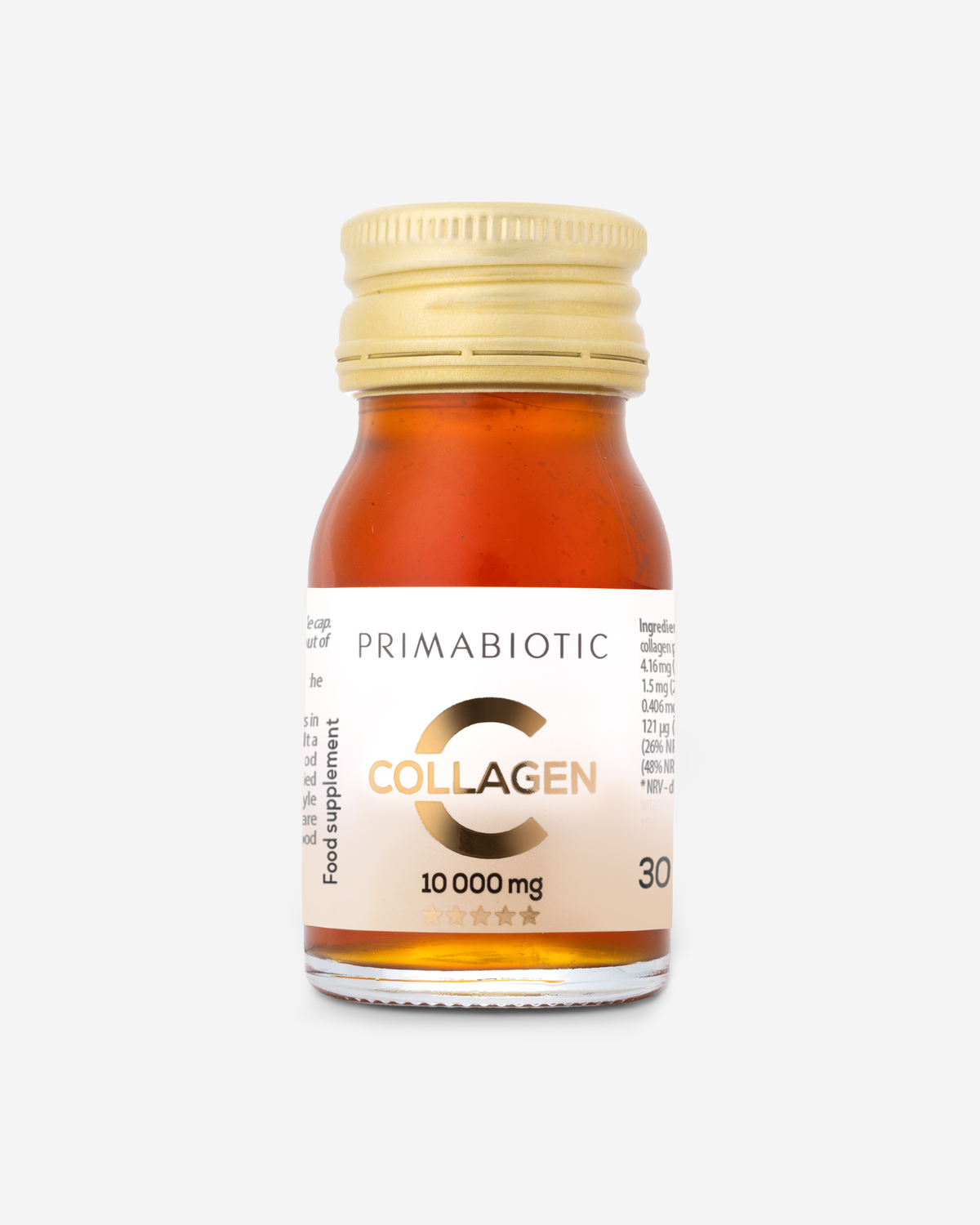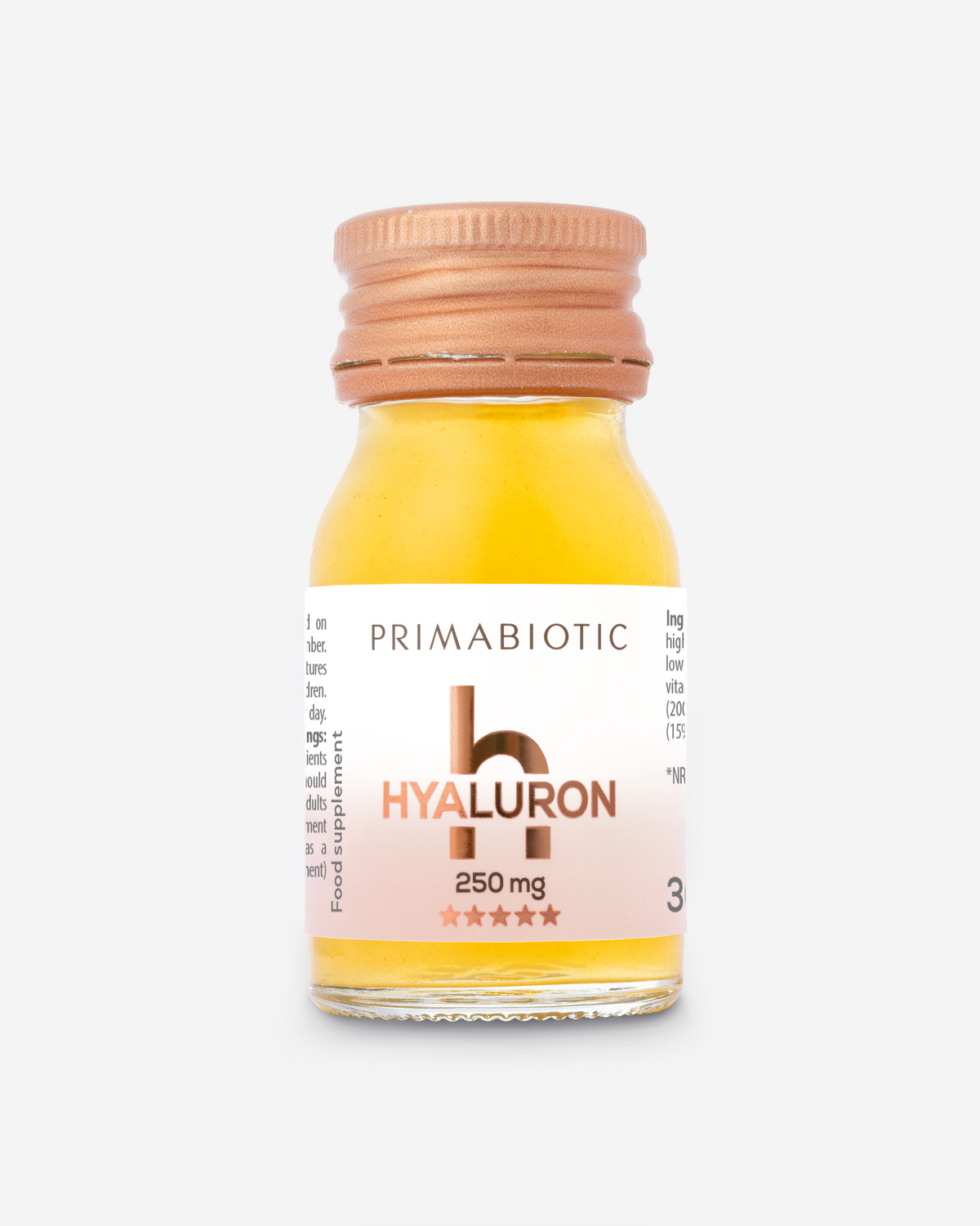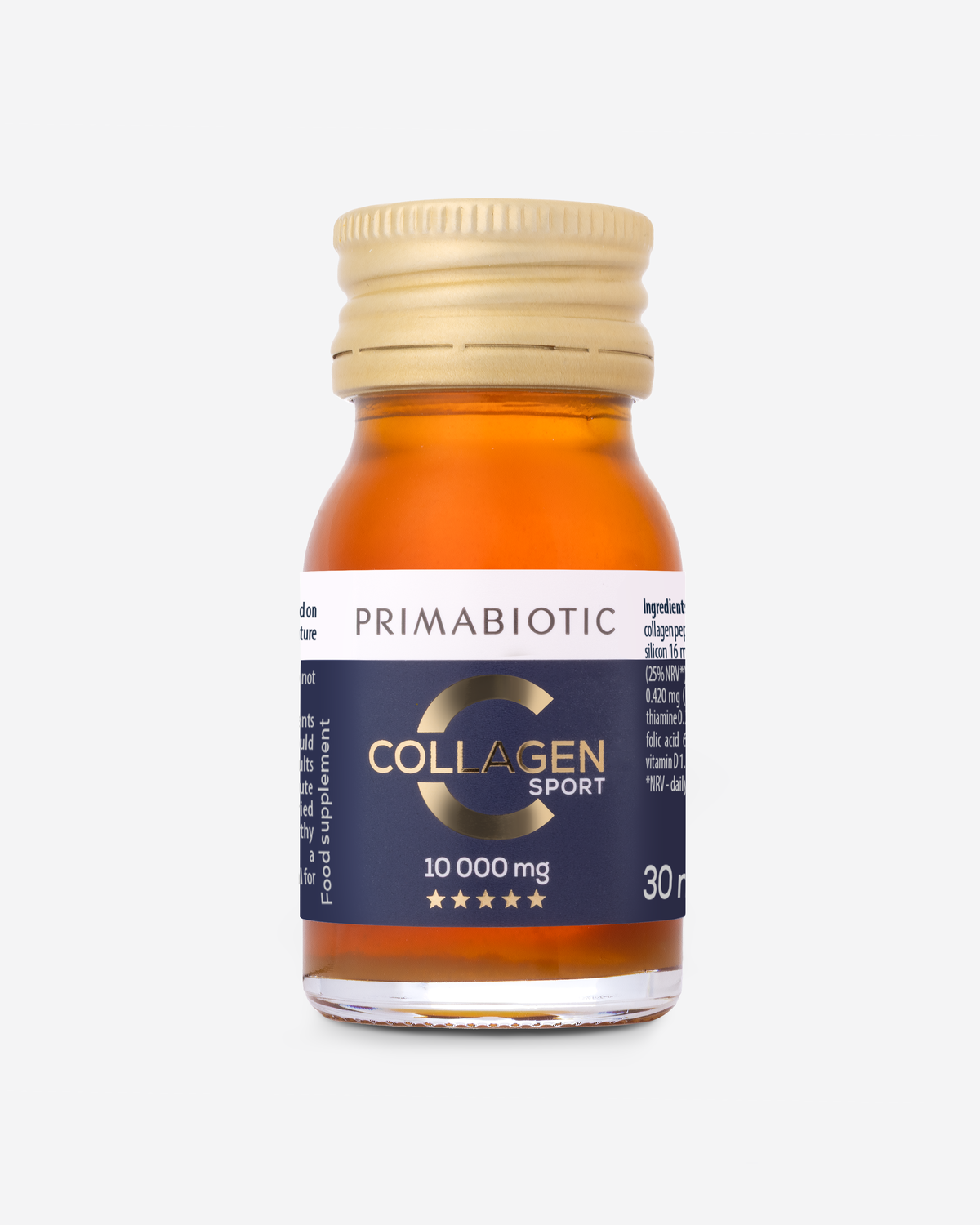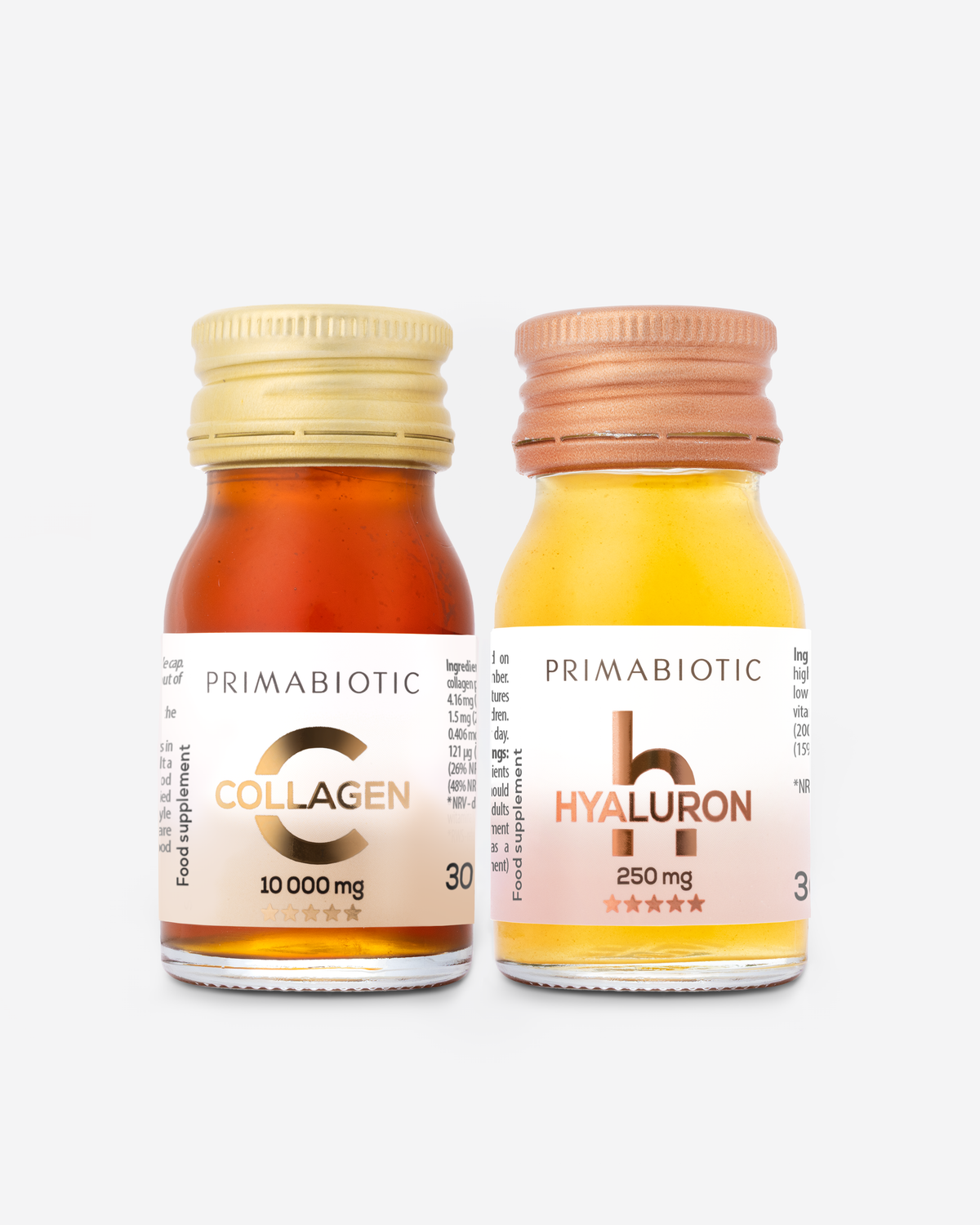Collagen is the most important structural protein in our bodies – it supports skin firmness, joint flexibility, and blood vessel health. Unfortunately, collagen levels naturally decline with age, and several factors can accelerate its breakdown. So, what destroys collagen? The main culprits include UV radiation, smoking, excessive sugar intake, chronic stress, lack of sleep, vitamin deficiencies (especially vitamin C), alcohol overuse, and exposure to smog and environmental toxins. All of these factors increase oxidative stress, trigger enzymes that break down collagen fibres, and inhibit collagen synthesis.
In this article, we’ll explain how collagen loss occurs, how to recognise it, and how to replenish collagen through diet, supplementation, and lifestyle changes.
How Does Collagen Loss Affect the Body?
Collagen loss isn’t just a cosmetic issue – it has a real impact on the functioning of many bodily systems. As we age, collagen synthesis slows down, which can lead to:
- Reduced skin elasticity and the formation of wrinkles
- Weakened joint structures and increased risk of injury
- Deterioration in blood vessel health
- Weakened hair and nails
- Decreased bone density and a higher risk of osteoporosis
Numerous studies show that collagen levels begin to decline after the age of 25 and decrease more rapidly with age, particularly in postmenopausal women.
What Destroys Collagen? What Should You Avoid?
Many environmental and lifestyle factors can contribute to faster collagen degradation. So, what damages collagen?
-
Excessive sun exposure (UV): Ultraviolet (UV) radiation – especially UVA – generates free radicals that damage collagen fibres and accelerate photoageing of the skin.
-
Smoking: Tobacco smoke reduces the supply of oxygen and nutrients to the skin and activates enzymes (matrix metalloproteinases) that break down collagen.
-
High sugar intake and ultra-processed foods: Advanced glycation end-products (AGEs) form when sugar binds to proteins, damaging collagen structure and reducing its elasticity. Diets with a high glycaemic index accelerate this process – a major factor in premature skin ageing.
-
Chronic stress and sleep deprivation: Cortisol, the stress hormone, can inhibit collagen synthesis and promote its breakdown. Lack of sleep also impairs tissue regeneration – a key factor when considering what destroys collagen from within.
-
Excessive alcohol consumption: Alcohol impairs nutrient absorption (including vitamin C, which is essential for collagen production) and promotes inflammation.
-
Environmental pollution: Exposure to smog, heavy metals, and pesticides can activate oxidative stress and damage the skin.
-
Vitamin and mineral deficiencies – especially vitamin C: Vitamin C is a cofactor necessary for the hydroxylation of proline and lysine – two amino acids crucial to collagen structure.
In summary: If you’re wondering what breaks down collagen, it’s important to look not only at your diet, but also at your daily habits and living environment. Being aware of and avoiding these factors can help preserve youthful, healthy skin for longer.
Signs of Collagen Loss in the Body
Collagen loss in the body can manifest in a range of symptoms, particularly changes in the skin (wrinkles, sagging, thinning), as well as weakened hair and nails. Other signs include fatigue, muscle aches, and delayed wound healing.
Common signs of collagen loss include:
Skin changes:
- Wrinkles, sagging, and rough or uneven skin texture
- Hollow areas around the eyes or on the face
- Thinner, less elastic skin
Muscles and joints:
- Joint pain and stiffness
- Reduced flexibility of tendons and ligaments
- Muscle weakness and discomfort
Hair and nails:
- Brittle nails and hair
- Slowed hair and nail growth
Other symptoms:
- Delayed wound healing
- General fatigue and weakness
How to Increase Collagen in Diet?
While it’s not possible to completely stop collagen loss, it can be slowed down significantly. Supporting collagen production through a healthy lifestyle and proper diet can make a real difference.
If you’re wondering how to increase collagen naturally, focus on foods rich in:
-
Amino acids (glycine, proline, hydroxyproline) – found in bone broth, gelatine, eggs, and meat
-
Vitamin C – bell peppers, parsley, and berries
-
Zinc and copper – pumpkin seeds, nuts, cocoa, and liver
- Antioxidants – these protect collagen fibres from oxidative stress (e.g. polyphenols from green tea and berries)
Supplements to Restore Collagen Levels in the Body
If you're looking for a more targeted approach to replenishing collagen, supplements can be a helpful and safe option.
As we age, our bodies produce less collagen, leading to signs like sagging skin, wrinkles, and weak hair and nails. That’s why many people ask: how can I effectively boost collagen levels? One popular option is supplementation.
Studies on Primabiotic Collagen show that after just 90 days of regular use, users experienced a significant improvement in skin appearance – including fewer wrinkles, better elasticity and firmness, and stronger hair and nails. Importantly, the product was well-tolerated and dermatologically tested.
So, if you’re wondering how to replenish collagen effectively, a high-quality supplement can be a valuable part of your routine – especially if your goal is youthful-looking skin and stronger hair.
Lifestyle Habits - UV Protection, Stress Reduction, Physical Activity
In addition to supplementation, lifestyle plays a crucial role in supporting natural collagen production. How you eat, rest, and care for your skin directly impacts the rate at which collagen breaks down or is built up.
-
Sun protection: Daily use of SPF helps prevent UV-induced collagen degradation.
-
Stress management and quality sleep: Both support tissue repair and reduce cortisol-related collagen loss.
- Regular physical activity: Improves circulation and may stimulate collagen production in joints and skin.
See also other articles:





